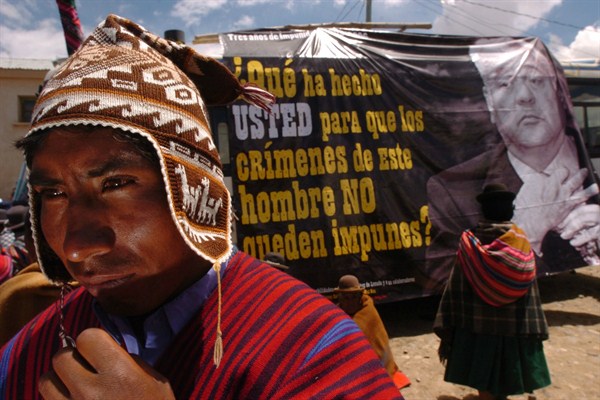After six days of deliberation, a jury in Fort Lauderdale, Florida, last week declared Bolivia’s former president, Gonzalo Sanchez de Lozada, and defense minister, Carlos Sanchez Berzain, guilty under U.S. law of extrajudicial killings committed in Bolivia 15 years ago. Damages of $10 million were awarded to the case’s eight plaintiffs, who all lost family members during the 2003 security crackdown on protests in Bolivia over a proposed natural gas pipeline running to Chile. Both Sanchez de Lozada and Sanchez Berzain have been living in exile in the United States since they fled Bolivia after the violence in what became known as the Bolivian gas war.
The landmark case was brought under the 1991 Torture Victims Protection Act, or TVPA, among the world’s most far-reaching human rights laws. The act permits civil suits within the United States for extrajudicial killings and torture committed by officials of a foreign government once the possible remedies in their home country are exhausted. “The most significant outcome of this case, I think, is that the jury accepted the idea that the president and minister of defense were liable for conduct of soldiers in the field,” says Judith Chomsky of the Center for Constitutional Rights, part of the legal team for the plaintiffs.
“The case greatly strengthens the reach of the TVPA because the plaintiffs were able to hold high-level government officials liable for killings and shootings by military forces under a ‘command responsibility’ theory of liability,” adds attorney Paul Hoffman, who was also part of the legal team. “It reaffirms the U.S. Congress’ intent to open our federal courts to human rights victims when the perpetrators are found on U.S. soil. This decision will make the U.S. less of a safe haven for human rights violators, as Congress intended.”

